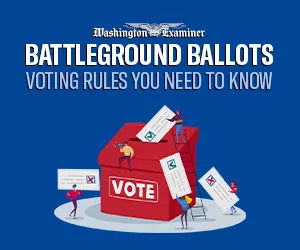
Early voting is poised to get underway in several states this month. The Washington Examiner will take a closer look at the swing states, including voting rules you need to know and key differences from prior elections. Part Seven of Battleground Ballots will focus on what has changed in Georgia, the state with the closest margin in 2020 that has grabbed election integrity headlines ever since.
Former President Donald Trump is still upset over what happened in Georgia in 2020, though he can’t do much about it now.
Trump went so far as to back a primary opponent to Gov. Brian Kemp (R-GA), who backed Georgia’s election results in 2022. But Kemp ran away with his reelection bid and remains in power, something Trump complained about in public as recently as last month.
The two now say they’re on solid ground, but wider election integrity battles linger in the Peach State. With absentee ballots set to go out as early as Sept. 17 and early voting beginning Oct. 15, those matters will wade right into, and possibly beyond, Election Day on Nov. 5.
Here’s what you should know about Georgia‘s elections and voting rules ahead of November:
Legal hurdles
Three Trump allies on Georgia’s State Elections Board helped pass new election regulations in August, prompting a lawsuit from Democrats. The changes call for more stringent treatment of ballot counting and election certification, but Democrats claim that an ethics complaint against the trio from Fulton County’s former elections board chief should have been looked into before new measures were passed.
They also say the board members should be removed.
“These novel requirements introduce substantial uncertainty in the post-election process and, if interpreted as their drafters have suggested, invite chaos by establishing new processes at odds with existing statutory duties,” the lawsuit says about the proposed electoral changes.
The lawsuit was filed by the Democratic National Party, Georgia Democratic Party, local officials, and political candidates, with the support of Vice President Kamala Harris’s election campaign.
The move to change the electoral rules shortly before the 2024 election was even met with criticism from some Republicans, including Secretary of State Brad Raffensperger, who said, “Activists seeking to impose last-minute changes in election procedures outside of the legislative process undermine voter confidence and burden election workers.”
Kemp says he is looking into whether he has the authority to remove the three board members.

Voting law changes
Kemp hasn’t been wholly antagonistic toward Trump’s claims of irregularities in the 2020 election. Notably, in 2021, the Georgia governor signed a set of what Republicans described as “election integrity” measures that were fiercely criticized by Democrats, leading to Major League Baseball moving its all-star game out of Atlanta.
The governor signed another set of overhauls into law in May of this year, which clarifies under what circumstances a voter can be removed from eligibility rolls and makes other tweaks to voting laws. Opponents dubbed the new rules a “voter suppression bill” and a “gift to MAGA election deniers.”
The bill requires counties to report absentee ballot results within an hour after polls close in hopes of getting races called much faster than they were four years ago.
Who can vote?
In order to vote in Georgia, one must be a citizen of the United States, a legal resident of the county in which you vote, at least 18 years of age, not serving a sentence for conviction of a felony “involving moral turpitude,” and not been found mentally incompetent by a judge.
Is mail-in and early voting available? When will votes be counted?
Absentee voting by mail or drop box is available to any registered voter in Georgia, even if they won’t be absent from their home county on Election Day. Ballots can be requested online or by mail and returned by mail or drop box.
Absentee ballots can be applied for as early as Sept. 16 but no later than Oct. 25. They must be received by the close of polls on election day to be counted.
Who is on the ballot in Georgia?
Georgia has a relatively light down-ballot schedule, with no governor’s race and no Senate contests to be decided in 2024. However, it makes up for the lack of local drama by being one of the top battleground states in the nation, with both Trump and Harris making frequent campaign stops in Georgia.
A solidly red state at the presidential level from 1996 through 2016, Georgia went blue in 2020 by a margin of just 11,779 votes, or just 0.23%. As of Sept. 6, the race is virtually tied, with Harris holding a 0.1% lead in the RealClearPolitics polling average for the Peach State.

Elsewhere, all 14 of Georgia’s representatives will face reelection battles, though the only close race may be in the 2nd District, where Rep. Sanford Bishop (D-GA) hopes to hold onto a seat he’s occupied since 1993 in a rural area rated D+3 by the Cook Partisan Voting Index. Hundreds of state and local elections will also be decided.
Crucial counties
Georgia is dominated economically, culturally, and politically by metro Atlanta, where more than half of the state’s population resides. Fulton County, which contains most of the city of Atlanta, has long been a Democratic stronghold known for tabulating results slowly. However, it bucked that history during the May primaries by generating quick returns.
Suburban counties such as Cobb and Gwinnett, which boast more than 750,000 residents each, were GOP strongholds in the 1990s and 2000s but have shifted blue thanks to Trump’s redefinition of the Republican Party and to demographic shifts that have seen more non-white voters making up the rolls.
Trump will hope to run up huge margins in rural South Georgia counties and in places like Rep. Marjorie Taylor Greene’s (R-GA) mountainous northwestern district, while keeping things close in the big suburbs. Harris will look to get even better returns than President Joe Biden did in the Atlanta area in order to win.
Certifying the vote
There is still contention about the vote certification process. The Georgia State Election Board has adopted rules requiring county election officials to create lists of voters who cast ballots, including their voting method, and then to examine the lists for duplicates before certifying the vote.
Groups, including the ACLU of Georgia and the Public Rights Project, say the rules illegally broaden the authority of election board members.

Georgia will not have a vote recount unless the margin is less than or equal to 0.5%, which was the case in 2020. If that happens, a request must be made within two business days of certification for the recount to happen.
County-level returns must be certified by Nov. 12, meaning the deadline to request a recount is Nov. 14. The last day for the Georgia Secretary of State to certify votes for federal and statewide contests is Nov. 22.
Poll observers
Georgia poll watchers are able to observe at polling places on election day and during advance voting, and can be granted access behind enclosed spaces to watch the conduct of the election and the counting and recording of votes. Candidates cannot be poll watchers.
Thanks to a new law that took effect July 1, poll watchers will enjoy closer access this year than they have in the past. Specifically, they will now be able to “sit or stand as close as is practicable” to whatever activity they are observing.
There is a legal distinction between a poll “watcher” and an “observer. ” A “watcher” is a legal designation requiring an appointment process and training, while an “observer” is a regular member of the public who views the process from the sidelines.
CLICK HERE TO READ MORE FROM THE WASHINGTON EXAMINER
While there was much wrangling after 2020, and battles are already being fought over this fall’s contest, election officials insist they are prepared to run a smooth operation in Georgia for both voters and poll workers.
“Voters will have a wonderful experience at the polls in 2024,” Raffensperger said in May. “In most cases, they will be out in under two minutes and have confidence in the process thanks to the hard work of election officials across Georgia.”






